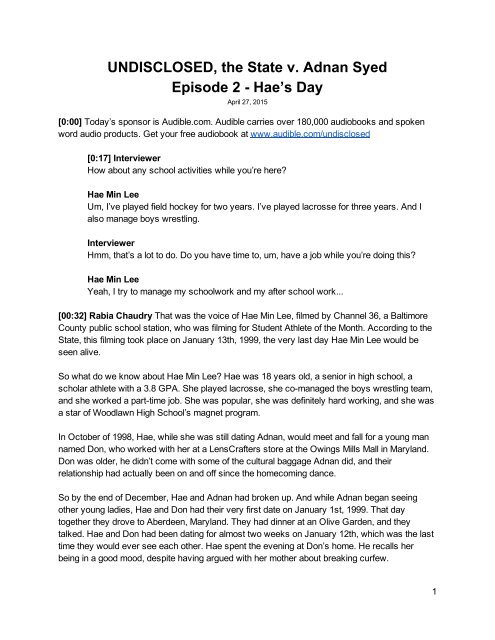
- Serial podcast episode 7 transcript manual#
- Serial podcast episode 7 transcript professional#
- Serial podcast episode 7 transcript series#
As a form of democratic politics that begins with listening and is attentive to the experience, conditions, and stories of people where they live and work, organizing needs practices for listening well. In this episode, podcast host Luke Bretherton examines the second key tool organizing uses for listening, building relationships, and effecting change: the house meeting. Jeffrey Stout, “Face-to-Face Meetings,” Blessed are the Organized: Grassroots Democracy in America (Princeton, NJ: Princeton University Press, 2010), Chapter 12. Arnie recently published a book narrating all this work entitled: "Lessons Learned: Stories from a Lifetime of Organizing" (ACTA, 2020)Įdward Chambers with Michael Cowan, "The Relational Meeting," Roots for Radicals: Organizing for Power, Action, and Justice (New York: Continuum, 2004), Chapter 2 More recently he worked with the British Labour Party to develop the insights of organizing for local party politics in the UK.
Serial podcast episode 7 transcript professional#
Lina Jamoul is Executive Director of the Minnesota Association of Professional Employees and has wide experience of community organizing both in the US and UK.Īrnie Graf began organizing work as part of the civil rights movement in the 1960s and then went on to work with the Industrial Areas Foundation (IAF) for over forty years.

In the second part, Luke talks to Arnie Graf to reflect further on some of the tensions and issues that arise in doing one-to-ones. In the first part, podcast host Luke Bretherton discusses with Lina Jamoul about what is a one to one, what it involves, and how it differs from other ways of engaging with people in democratic politics. This episode discusses why and how listening is the beginning point of democratic organizing and the role of the one-to-one or relational meeting in that work. Mark Engler and Paul Engler, This is an Uprising: How Nonviolent Revolt is Shaping the Twenty-First Century (New York: Nation Books, 2017), 251-284.
Serial podcast episode 7 transcript manual#
Lee Staples, “‘Power to the People’ Basic Organizing Philosophy and Goals,” Roots to Power: A Manual for Grassroots Organizing, 3rd edn (Santa Barbara, CA: Praeger, 2016), 1-14, 21-35 Luke Bretherton, "The origins of organizing: an intellectual history," Resurrecting Democracy: Faith, Citizenship and the Politics of a Common Life (Cambridge: Cambridge University Press, 2015), Chapter 1īernard Crick, In Defence of Politics (London: Continuum, 2005) Reveille for Radicals (various editions), Chapter 11 They each tell something of their story at the beginning of the episode. Mike has been an organizer for over forty years, written extensively on organizing, and done much to shape its contemporary practice.


Keisha recently became lead organizer with Greater Cleveland Congregations having been an organizer in Milwaukee for a number of years before that. Guests: Keisha Krumm and Mike Gecan are two very experienced organizers with the Industrial Areas Foundation. What is constant is the need for relationally driven, bottom up forms of democratic politics.

As you will hear, boundaries between labor and community organizing, as well as between movement building and community building work are fluid. Keisha and Mike prefer to talk about organizing as the work of enabling people to come together to build power to effect democratic change where they live and work. Podcast host Luke Bretherton talks to Keisha Krumm and Mike Gecan about what is community organizing, what it involves, and why it matters. Community organizing can also be referred to as broad-based organizing, institution-based organizing, faith-based organizing, or neighborhood organizing.
Serial podcast episode 7 transcript series#
Through a series of conversations with folk who live and breathe the work of organizing, this series looks at democracy as not first and foremost about a system of government, or set of laws, or an ideology but as rooted in three things: The Listen, Organize, Act! Podcast focuses on the history and contemporary practice of community organizing and democratic politics.Īlongside this main focus, the podcast also explores two questions: 1) how organizing connects democracy and religion, particularly at a local congregational level and 2) how organizing embodies a distinctive vision and practice of democratic politics, one that seeks to embody, struggle for, and protect the shared flourishing of all. Cushman Distinguished Professor of Moral & Political Theology at Duke Divinity School and a Senior Fellow of the Kenan Institute for Ethics and developed in collaboration with the Industrial Areas Foundation. It is hosted and facilitated by Luke Bretherton, Robert E. The Listen, Organize, Act! Podcast is sponsored by a Community Ethics Collaboration grant from Duke’s Kenan Institute for Ethics.


 0 kommentar(er)
0 kommentar(er)
